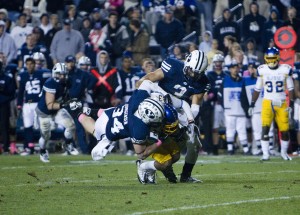Famika Anae’s personal identity changed from a BYU offensive lineman in his 2012 breakout season to just another big guy on campus after losing his medical clearance to play just two hours before playing Utah State.
“It was hard to swallow,” Anae said of the realization that came to him the night team doctors told him his career was over because of recurring knee injuries.

Anae joins many other college athletes whose careers are cut short each year due to injury taking a toll on their physical and emotional health and financial stability.
Many Cougar football fans are familiar with in-state rival University of Utah’s former quarterback Jordan Wynn and the end of his career a little more than a year ago.
During the second game of his senior season, Wynn received the fourth shoulder injury of his career when a Utah State defender hit his left shoulder.
“When the doctors told me I couldn’t play anymore, I took some time off and thought, ‘What do I want to do?'” Wynn told ESPN in an interview. “Within days, I (couldn’t) imagine life without the game of football. I’ve been playing it since I was 7 years old. That’s how I was brought up. I can’t envision life without it.”
Wynn dropped to an emotional low and took two weeks off from school to get himself together at home in San Diego. Without football, Wynn, like others, didn’t know where his future would take him.
“When student-athletes no longer compete, some lose their sense of ‘sports self-esteem,’ said Mark Anshel, a sports psychologist at Middle Tennessee State University.
“When you take that away, the very core of their importance … you take that away from their lives, they feel they become less of a person,” said Anshel, who has more than 30 years of experience working with student-athletes. “They’re less valued as an individual, and it’s a real blow to their personality, to their self-esteem, to their sense of importance to the world.”
The end of football meant a lifestyle change Anae wasn’t ready for.
“I got pretty lazy with my workouts and eating right. There was no reason anymore,” Anae said. “It was hard to deal with it.”
Like many other athletes, Anae dealt with anger and depression.
“I was established on the team. I was very bitter. Very angry,” Anae said.
While many universities provide care for their athletes, from taping ankles to providing ice baths, the NCAA does not require universities to provide athletes with insurance or to continue care to any degree if careers end because of injury. Universities are also not required to honor scholarships of athletes if they are no longer physically able.
Some states are beginning to make provisions to aid injured athletes.
Gov. Jerry Brown of California has led the way, signing SB1525 this past September protecting athletes of USC, UCLA, Cal and Stanford. This bill is essentially a bill of rights for student-athletes, providing them with more protection and assurance should they be injured. Each of these four schools rake in more than $10 million each year in media revenue.
Luckily for BYU athletes, BYU continues to honor scholarships and provide academic support even after athletes have to hang up the jersey for life according to Anae and fellow former Cougar Austen Jorgensen.
Recovering from the loss of sports self-esteem can be difficult for those without adequate social support around them.
“She helps me see the light at the end of the tunnel,” Jorgensen, a former linebacker who was deemed no longer fit for athletic competition, said of his wife.
Teammates and coaches have continued to reach out to Jorgensen during his time of adjustment, and BYU still honors his scholarship.
For athletes who had plans of going pro but were sidelined permanently with no university support, the light at the end of the tunnel can be more difficult to see.
Stanley Doughty is like many other college athletes who do not attend universities that provide the same support as BYU.
Doughty, a defensive tackle who finished his junior year at the University of South Carolina in April 2007, was diagnosed with an acquired spinal injury after signing with the Kansas City Chiefs. Football, a sport responsible for more than 20,000 injuries each year according to NCAA reports, proved to be too much, and the Chiefs released him.
Doughty was left with no job, no degree and no insurance to cover the costs of surgery needed.
For Wynn, playing in the NFL will never happen. But his new occupation as a graduate assistant coach at the University of Hawaii will have to do for now.
“There’s no feeling that can compare to throwing a touchdown,” Wynn told ESPN. “But at the same time, seeing a quarterback do everything right on a certain play, or make the right audible at the right time, is a different emotion that’s very fulfilling.”




